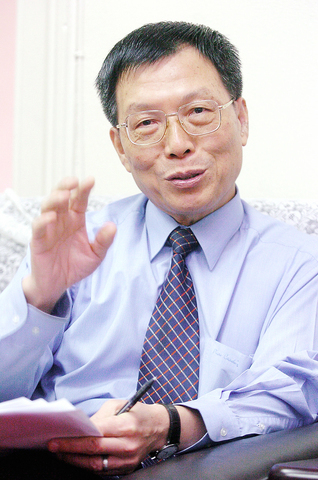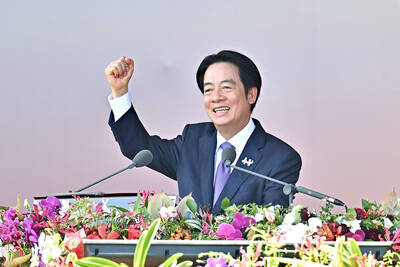Taipei Times: As the first Taiwan Tobacco and Liquor Corp (
Martin Tsai (蔡木霖): I've been at Taiwan Tobacco for more than 20 years. I entered the firm on July 1, 1986. From what I've seen, Taiwan Tobacco's biggest advantage is that it enjoys the trust of consumers. This trust was built at the time when the company was known as the Taiwan Tobacco and Alcohol Monopoly Bureau (菸酒公賣局). With two missions -- affordability and accessibility -- the monopoly bureau established a comprehensive nationwide retail network, making it easy to safeguard its turf when foreign brands of wine and liquor came into the local market.
But the duty of offering affordable products has also limited our development of high-end merchandise, for in the public's mind Taiwan Tobacco's price tags must be consumer-friendly -- even if some of our products are of better quality than that of our competitors. How to break this stereotype has become a key issue. Solutions include developing biotechnological products to create a high-quality image.

PHOTO: GEORGE TSORNG, TAIPEI TIMES
TT: But despite Taiwan Tobacco's legacy of being a traditional brand, young people seem a bit detached as they generally associate Taiwan Beer -- Taiwan Tobacco's star product -- with the elderly. How do you plan to change this impression?
Tsai: It is our responsibility to improve our product line to win young people over. We cannot simply ask consumers to love "Made in Taiwan" products. In this regard, we've successfully transformed our beer, making the new Gold Medal Taiwan Beer (金牌台灣啤酒) a young brand. Its market share has increased from 17.57 percent last year to 19.42 percent this year, becoming the second-biggest brand after Taiwan Beer in the nation's beer market.
Many international friends in Taiwan have also fallen in love with Gold Medal [launched in April 2003]. If you visit our Taipei Brewery [also called Taipei Beer Factory, which includes a bar, garden and KTV room] on Bade Road at night, you'll find that 60 percent of the customers are foreigners.
Our new series of "Gentle" (
TT: With all these image-transforming efforts underway, what are some of Taiwan Tobacco's weaknesses you think should most importantly be addressed?
Tsai: One of our priorities is to transform part of the production workforce into marketing staff.
Personnel demand has dropped as our production lines have been computerized. Also in the era of the monopoly, marketing was not deemed important. Our products didn't need marketing. But after the market opened up to foreign competitors, you naturally need to put more investment into marketing to safeguard your market dominance.
In the past, the proportion of production line personnel to marketing staff was eight to two. It has changed to seven to three, with over 2,000 marketing crew out of the firm's total 6,722 workers. My ultimate goal is to adjust the ratio to six to four.
TT: You mentioned at a previous event that adjusting employees' mentality is one common issue among many government-owned businesses. How's the reform progress so far?
Tsai: I've tried to instill the concept of "customers first," to make our employees realize that their job is serving consumers, not just sitting in front of a desk. This is about getting rid of their "public official attitude" to introduce the "market competition mindset." It takes patience and long-time work to change those attitudes.
For example, immediately after the earthquakes last week, our crisis management mechanism kicked in and we asked that our colleagues rush to service areas to check and report back whether any damages had occurred. If they believed that their only responsibilities lay with their day shift, they would have said: "I'm already off work" and not done anything until the following day.
It is the same with our factories. With products sent out on Friday nights, our colleagues must work extra time on Saturday to make sure the products are delivered to our customers, like grocery shops and convenience stores. Business opportunities exist when most people are off. These are simple business concepts, but I expect our employees to incorporate them in how they see the business.
I have also attempted to diminish the administrative workload through computer technology. In duplicating the procedures used by private corporations, I demand that first-line chiefs hold morning meetings every day, for five to 10 minutes, where they discuss business performance and look for ways to boost efficiency. No reports or minutes are required.
TT: The legislature in November again slashed the budgets earmarked for the company's privatization, further postponing the schedule that your predecessors also tried to push forward. What's your view on that?
Tsai: Privatization is the path Taiwan Tobacco will have to take one day. I personally think the sooner the better, but union members have opposed it as they worry about job losses.
Taiwan Tobacco is a traditional company, with stable profits and a healthy financial structure. These are the qualities that investors are looking for. If we can bring in financial -- rather than strategic -- investors, our original management team will stay on and employees should feel at ease.
TT: But the union still has concerns. How will you deal with them?
Tsai: If they have doubts about privatization, we'll produce outstanding performances, initially via organizational restructuring. Some changes may seem trivial, but once you put them all together, they'll push the whole company upward.
For example, first-line marketing personnel will obtain a personal digital assistant (PDA) in the coming year, which will enhance communication in two ways: allowing them to quickly gather market information to reflect and analyze competition. This way, we'll be able to collect information in traditional retail channels which even ACNielsen Taiwan does not access.
TT: We heard that Taiwan Tobacco has had a three-stage plan for international expansion, especially in China. Would you elaborate on that?
Tsai: In the first stage, we focus on sales cooperation, generating brand awareness and building a complete retail network in China. Duty-free shops in Shenzhen, Zhuhai and Shanghai already sell our tobacco, with Long Life (
As for taxed cigarettes, the result of a bidding process to choose our distributor in China should ve known toward the end of next month. By that time, we'll be able to enter the Chinese market.
As for beer, we're still waiting for the Chinese government's approval to register the Taiwan Beer brand name as a trademark. Once it has been approved, we'll start exporting products from Taiwan to costal areas in China, where more Taiwanese businesspeople reside, before moving inward to other provinces.
In the second stage, we'll grant authorization to local manufacturers or look for original equipment manufacturing partners to produce our products.
Our employees will also have to be stationed there to oversee manufacturing. We have trained over 100 personnel who have manufacturing licenses. They'll be ready when the time comes.
In the third and final stage, as is common practice with most companies, we'll look for opportunities to form joint ventures or mergers to expand our market base and will look to build factories in China to save on shipping costs.
TT: Taiwan Tobacco has made efforts to develop businesses in Japan, South Korea, the US and Europe. How much do overseas sales contribute to overall revenues?
Tsai: They only account for 1.5 percent. But I'd like this to grow. Last year's performance was quite good. As of the end of November, sales had increased by NT$1.12 billion [US$34.4 million] from the same period a year ago. Whole-year revenues are expected to reach NT$61.8 billion. Our goal for this year is to boost sales by 3 percent.
Growth drivers will come from the core business -- tobacco and liquor, the new biotechnological division and sales at our breweries nationwide.

The Ministry of the Interior (MOI) is to tighten rules for candidates running for public office, requiring them to declare that they do not hold a Chinese household registration or passport, and that they possess no other foreign citizenship. The requirement was set out in a draft amendment to the Enforcement Rules of the Public Officials Election and Recall Act (公職人員選舉罷免法 ) released by the ministry on Thursday. Under the proposal, candidates would need to make the declaration when submitting their registration forms, which would be published in the official election bulletin. The move follows the removal of several elected officials who were

FOUR DESIGNATED AREAS: Notices were issued for live-fire exercises in waters south and northwest of Penghu, northeast of Keelung and west of Kaohsiung, they said The military is planning three major annual exercises across the army, navy and air force this month, with the navy’s “Hai Chiang” (海強, “Sea Strong”) drills running from today through Thursday, the Ministry of National Defense said yesterday. The Hai Chiang exercise, which is to take place in waters surrounding Taiwan, would feature P-3C Orion maritime patrol aircraft and S-70C anti-submarine helicopters, the ministry said, adding that the drills aim to bolster the nation’s offshore defensive capabilities. China has intensified military and psychological pressure against Taiwan, repeatedly sending warplanes and vessels into areas near the nation’s air defense identification zone and across

SENATE RECOMMENDATION: The National Defense Authorization Act encourages the US secretary of defense to invite Taiwan’s navy to participate in the exercises in Hawaii The US Senate on Thursday last week passed the National Defense Authorization Act (NDAA) for Fiscal Year 2026, which strongly encourages the US secretary of defense to invite Taiwan’s naval forces to participate in the Rim of the Pacific (RIMPAC) exercise, as well as allocating military aid of US$1 billion for Taiwan. The bill, which authorizes appropriations for the military activities of the US Department of Defense, military construction and other purposes, passed with 77 votes in support and 20 against. While the NDAA authorizes about US$925 billion of defense spending, the Central News Agency yesterday reported that an aide of US

NATIONAL DAY: The ‘Taiwan Dome’ would form the centerpiece of new efforts to bolster air defense and be modeled after Israel’s ‘Iron Dome,’ sources said President William Lai (賴清德) yesterday pledged to strengthen the nation’s air defense capabilities and build a “T-Dome” system to create a safety net against growing military threats from China. “We will accelerate our building of the T-Dome, establish a rigorous air defense system in Taiwan with multi-layered defense, high-level detection and effective interception, and weave a safety net for Taiwan to protect the lives and property of citizens,” he said in his National Day address. In his keynote address marking the Republic of China’s (ROC) 114th anniversary, Lai said the lessons of World War II have taught nations worldwide “to ensure that